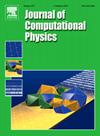关于使用非稳态速度边界条件的快速投影方法
IF 3.8
2区 物理与天体物理
Q2 COMPUTER SCIENCE, INTERDISCIPLINARY APPLICATIONS
引用次数: 0
摘要
本文旨在澄清和修正以前发表的关于使用伪压力近似值进行具有时变边界条件的快速不可压缩纳维-斯托克斯求解的结果。通过用简单近似代替压力投影,提出了加快高阶不可压缩 Navier-Stokes 求解器速度的快速投影方法。文献[1]提出了一种广义近似理论,其中忽略了随时间变化的边界条件。在本评论中,我们研究了非稳态边界条件对精度阶次的影响,并证明 [1] 中得出的压力近似值对所有 RK2 积分器都成立,而 RK3 近似值对某些系数集仅为三阶。我们证明了在其他情况下也会失去三阶,并揭示了阶次被破坏的原因。这项研究为快速投影方法处理非稳态边界条件提供了参考。我们对一个成熟的通道流问题进行了数值验证,该问题具有各种非稳态入口条件,适用于各种显式 RK2 和 RK3 积分器。本文章由计算机程序翻译,如有差异,请以英文原文为准。
On the use of fast projection methods with unsteady velocity boundary conditions
This article aims at clarifying and amending a previously published result on the use of pseudo-pressure approximations for fast incompressible Navier-Stokes solvers with time-dependent boundary conditions. Fast projection methods were proposed to speed up high-order incompressible Navier-Stokes solvers by replacing pressure projections with simple approximations. A generalized approximation theory was proposed in [1], in which the time-dependent boundary conditions were ignored. In this comment, we investigate the effect of unsteady boundary conditions on the order of accuracy and demonstrate that the pressure approximations derived in [1] hold for all RK2 integrators, while RK3 approximations are only third order for certain sets of coefficients. We show that third order is lost for other cases and shed light on why order is broken. This work serves as a reference for the treatment of unsteady boundary conditions for fast-projection methods. Numerical validation is performed on a well established channel flow problem with a variety of unsteady inlet conditions for a wide range of explicit RK2 and RK3 integrators.
求助全文
通过发布文献求助,成功后即可免费获取论文全文。
去求助
来源期刊

Journal of Computational Physics
物理-计算机:跨学科应用
CiteScore
7.60
自引率
14.60%
发文量
763
审稿时长
5.8 months
期刊介绍:
Journal of Computational Physics thoroughly treats the computational aspects of physical problems, presenting techniques for the numerical solution of mathematical equations arising in all areas of physics. The journal seeks to emphasize methods that cross disciplinary boundaries.
The Journal of Computational Physics also publishes short notes of 4 pages or less (including figures, tables, and references but excluding title pages). Letters to the Editor commenting on articles already published in this Journal will also be considered. Neither notes nor letters should have an abstract.
 求助内容:
求助内容: 应助结果提醒方式:
应助结果提醒方式:


